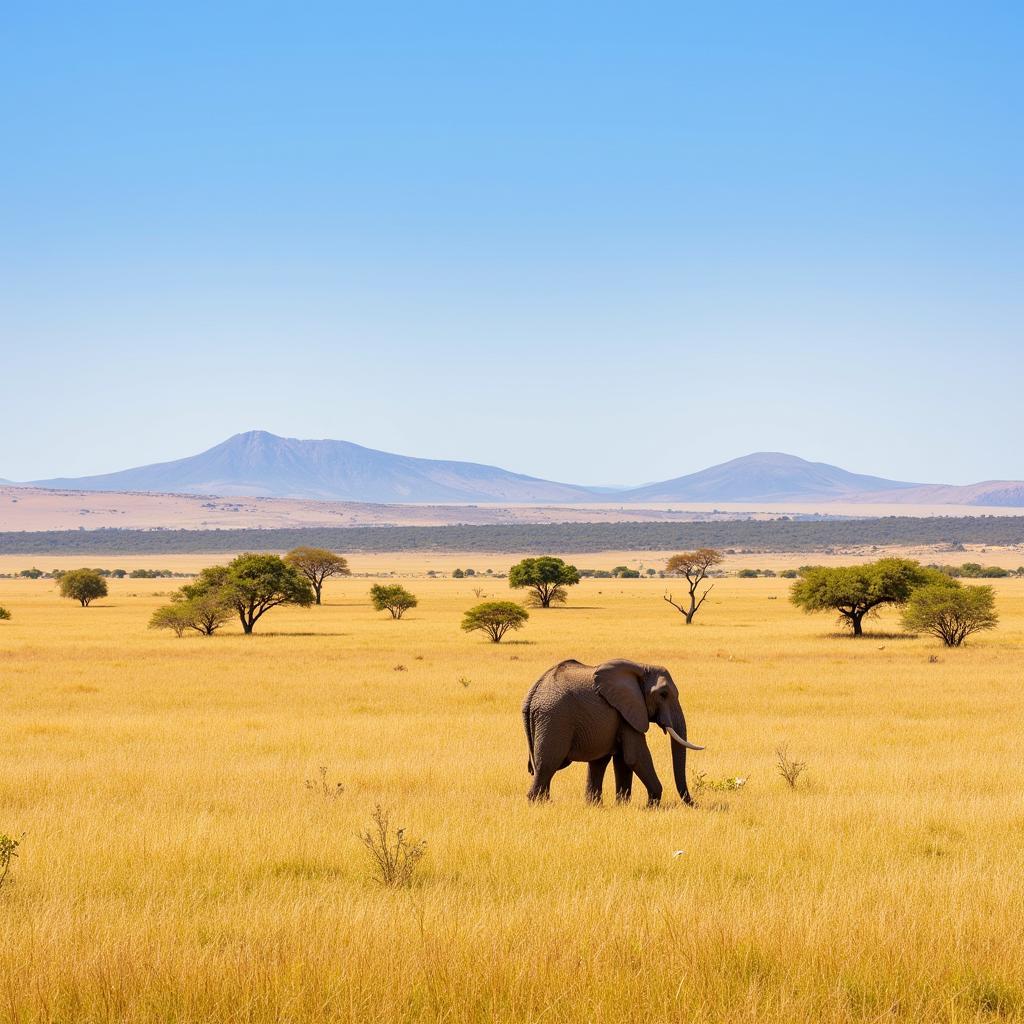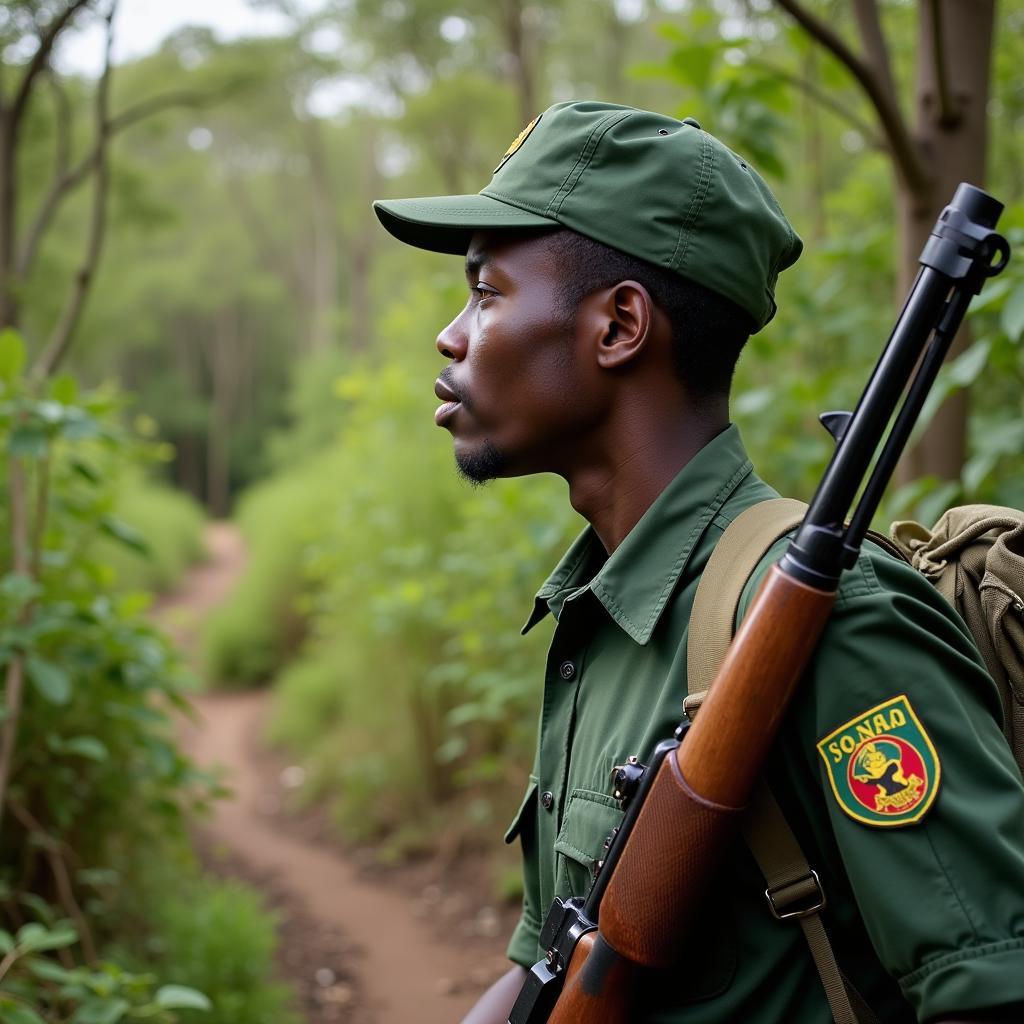African Elephant Mozambique: A Journey Through Conservation and Coexistence
Mozambique, a land of vibrant cultures and breathtaking landscapes, is also home to a significant population of African elephants. These majestic creatures, essential to the country’s ecosystem and cultural heritage, face numerous challenges. This article delves into the world of African elephants in Mozambique, exploring their ecological importance, the threats they face, and the ongoing efforts to ensure their survival for generations to come.
 African Elephant Roaming the Savannah
African Elephant Roaming the Savannah
Understanding the Giants: African Elephants in Mozambique
African elephants in Mozambique belong to the African bush elephant (Loxodonta africana) species, the larger of the two African elephant species. They are further categorized into two subspecies: the savanna elephant and the forest elephant. While savanna elephants primarily inhabit the open grasslands and woodlands of southern and central Mozambique, forest elephants reside in the dense forests of the north. These intelligent animals exhibit complex social structures, with herds led by matriarchs, showcasing strong family bonds and remarkable communication skills.
The Ecological Significance of African Elephants
African elephants play a vital role in maintaining the delicate balance of the Mozambican ecosystem. As herbivores, they shape their environment by grazing on vegetation, clearing pathways, and digging for water. This activity creates habitats for other species and facilitates seed dispersal, contributing to biodiversity. Their dung, rich in nutrients, acts as a natural fertilizer, enriching the soil.
Threats to Elephant Survival in Mozambique
Despite their ecological importance, African elephants in Mozambique confront numerous threats, primarily driven by human activities.
Poaching and the Ivory Trade
The illegal ivory trade poses a significant threat to African elephants across the continent, including Mozambique. Driven by demand from international markets, poachers target elephants for their tusks, decimating populations and disrupting social structures. The loss of matriarchs, repositories of knowledge and experience, has long-term consequences for herd survival and behavior.
 Anti-poaching Patrol in Action
Anti-poaching Patrol in Action
Habitat Loss and Fragmentation
Rapid human population growth, coupled with agricultural expansion and infrastructure development, leads to habitat loss and fragmentation for elephants. This restricts their movement, limits access to resources, and increases competition with humans, escalating the potential for human-wildlife conflict.
Human-Elephant Conflict
As human settlements encroach upon elephant habitats, encounters between the two species become increasingly frequent. These interactions can lead to crop raiding, property damage, and even loss of human or elephant life. Managing this conflict effectively is crucial for the coexistence of both elephants and humans.
Conservation Efforts in Mozambique
Recognizing the plight of African elephants, Mozambique has implemented various conservation measures, including anti-poaching initiatives, habitat protection, and community engagement programs.
Strengthening Anti-Poaching Efforts
Mozambique has stepped up its anti-poaching efforts by deploying rangers, strengthening law enforcement, and collaborating with international organizations. These initiatives aim to deter poaching, disrupt trafficking networks, and bring perpetrators to justice.
Protecting Elephant Habitats
Establishing protected areas and wildlife corridors is vital for elephant conservation. Mozambique has designated national parks and reserves, such as the Niassa National Reserve and the Gorongosa National Park, safeguarding critical elephant habitats and promoting their long-term survival.
Engaging Local Communities
Recognizing the importance of community involvement, conservation efforts in Mozambique focus on engaging local communities in elephant conservation. These programs provide alternative livelihood opportunities, promote sustainable practices, and foster a sense of ownership over natural resources.
The Future of African Elephants in Mozambique
The future of African elephants in Mozambique hinges on the sustained commitment to conservation, the effective enforcement of anti-poaching measures, and the mitigation of human-elephant conflict.
Embracing Sustainable Practices
Promoting sustainable land-use practices, such as responsible agriculture and eco-tourism, can help minimize human-wildlife conflict and ensure the long-term survival of African elephants in Mozambique.
Fostering International Cooperation
Addressing the illegal ivory trade requires concerted international cooperation. Collaborative efforts between range countries, transit countries, and consumer countries are crucial for dismantling trafficking networks and reducing demand.
Investing in Research and Monitoring
Continued research and monitoring of elephant populations are essential for informing conservation strategies, understanding population trends, and evaluating the effectiveness of conservation interventions.
Conclusion
African elephants in Mozambique face a challenging future. By addressing poaching, habitat loss, and human-elephant conflict, while empowering local communities and fostering international collaboration, we can ensure that these majestic creatures continue to roam the landscapes of Mozambique for generations to come. Their survival is not just an ecological imperative but a testament to our commitment to preserving the planet’s biodiversity and the cultural heritage of Mozambique.
FAQ
What is the current population of African elephants in Mozambique?
The estimated population of African elephants in Mozambique is highly variable due to poaching and habitat loss. Recent surveys suggest a population ranging between 10,000 to 20,000 individuals.
How can I contribute to elephant conservation in Mozambique?
You can contribute by supporting reputable conservation organizations, spreading awareness about the plight of elephants, and making responsible choices as a consumer, such as refusing to purchase ivory products.
Need Help?
For assistance, contact us:
Phone Number: +255768904061
Email: kaka.mag@gmail.com
Address: Mbarali DC Mawindi, Kangaga, Tanzania.
We have a 24/7 customer support team ready to assist you.
